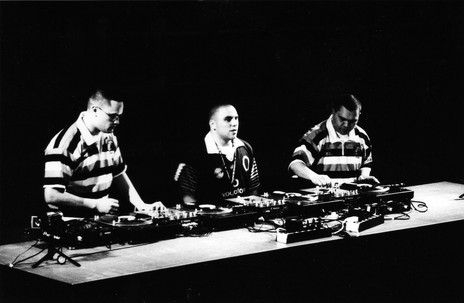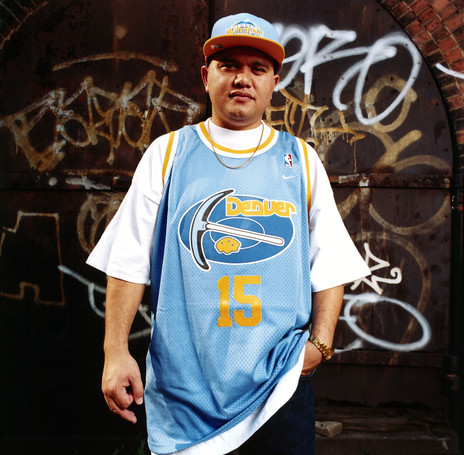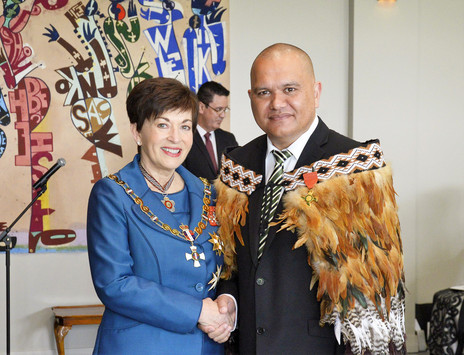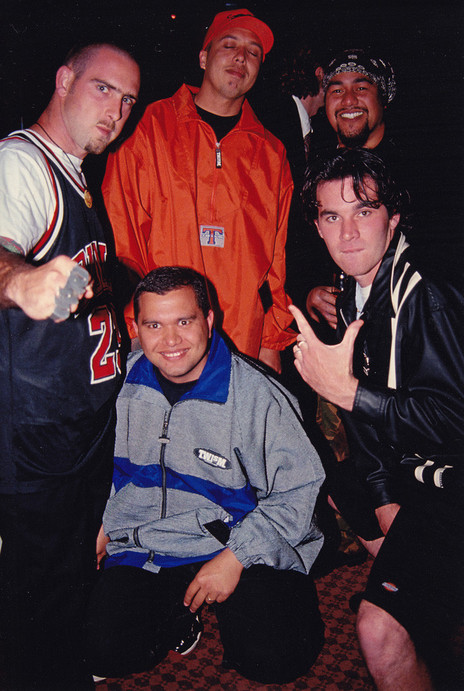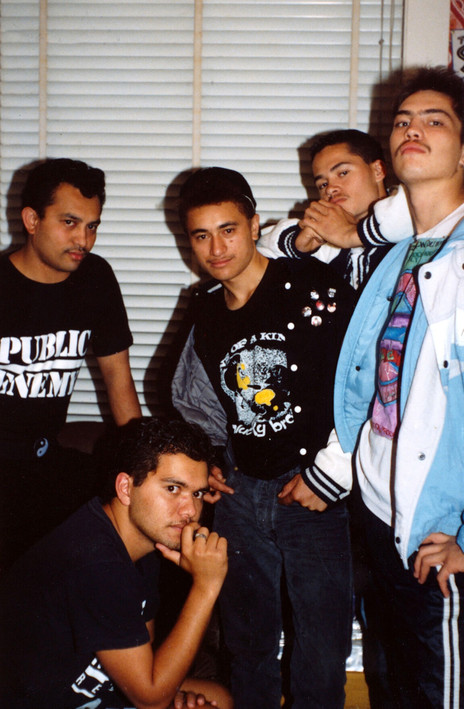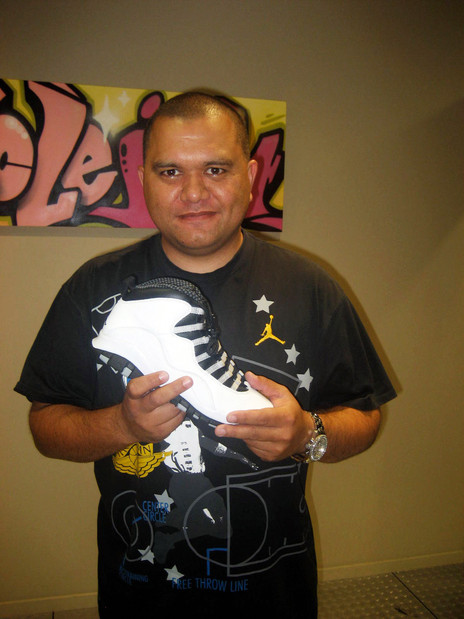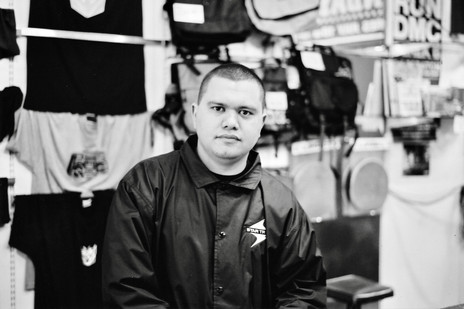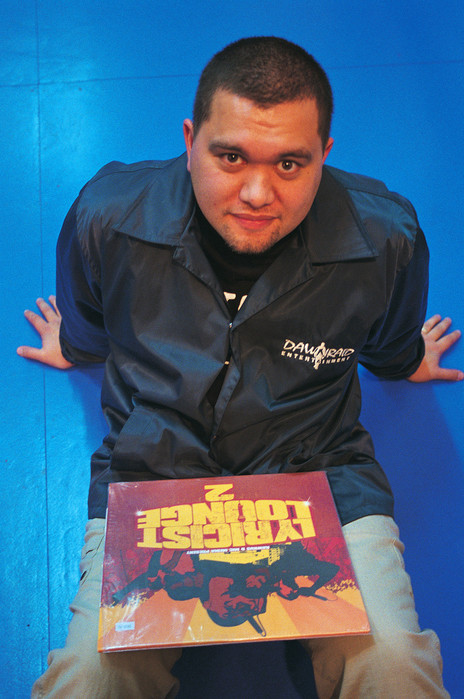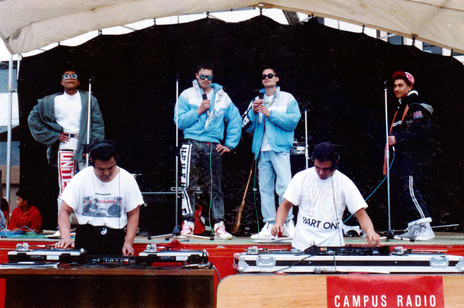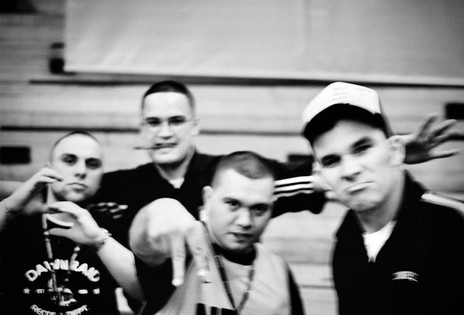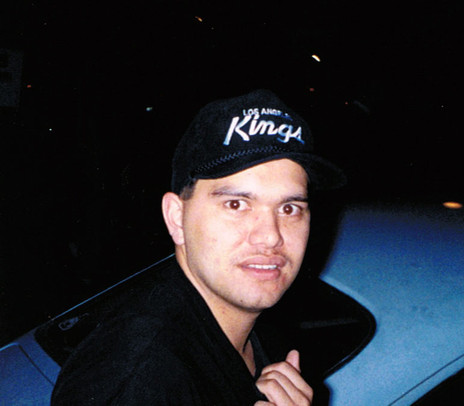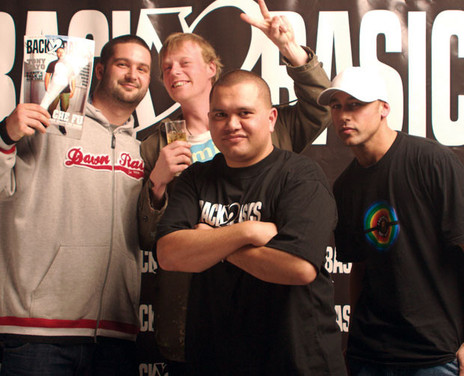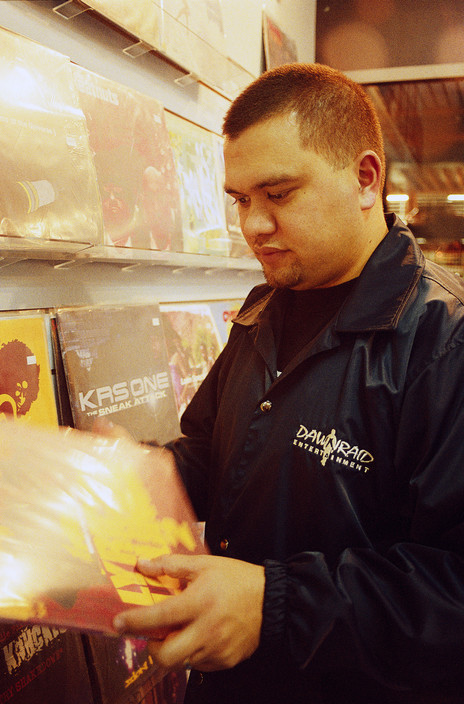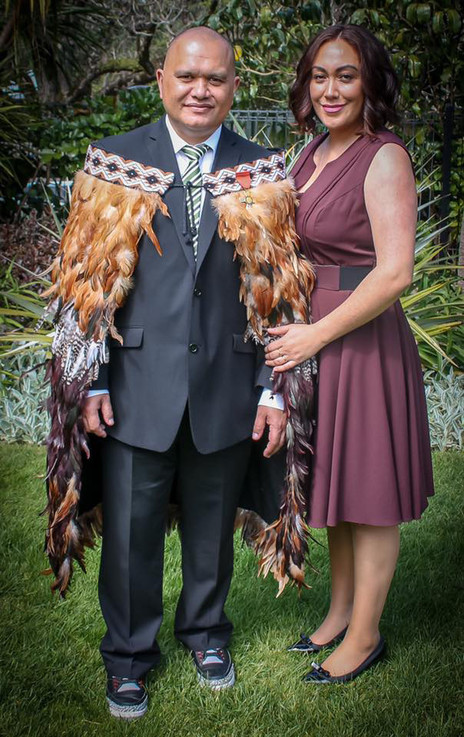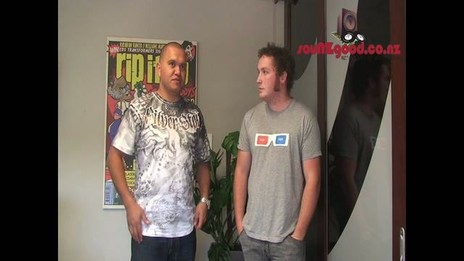When his father became a party DJ, Bell also learnt the ropes, though his attitude to the turntable changed completely when he discovered Roger Perry. “My friend Neil used to be a bar manager and let me into The Playground even though I was underage. It was two levels and the top floor had its own bar and I could kinda hide between it and the railing. I’d sit there all night and watch Roger Perry and write down the names of the songs ... It was a real hassle because I would stay there all night until six in the morning and sneak in. At the time, I just found Roger’s selection just so incredible. That was when I knew that it was something pretty big for me.”
His interest in hip hop was sparked by seeing the Style Wars documentary on television and later catching Beat Street at the cinema. He started working at Sounds record store in Manukau at age 17 and immediately made two new friends. “Me and Base worked together there – Robin Paretene. Our part-timer was Kirk Harding. He worked at Onehunga panel beaters and when he finished, he’d come across to Sounds and work with us. He was a real metal head. He had long hair and cowboy boots. I was into metal too, but he looked like he was in Guns N’ Roses. But he also liked hip-hop so we were all on the same wavelength.”
“I used to walk around Papakura with my ghetto-blaster, so they knew I had beats!”
Bell went on to work at 256 in the central city and through this work, he met a young DJ from Mt Eden, Ben Te Ariki, and the pair formed a crew called “Definitive”. Te Ariki was already adept at scratching records, which made Bell realise he had some catching up to do. Their real progress began when they joined forces with United Crew under the name “UCD” and the crew consisted of beat boxer Blaze and two MCs, Rick and Del C Rocks, as well as Royal-T (Mark Va’a, who went on to join Pacifican Descendants with Dei Hamo). Bell’s reputation preceded him. “I used to walk around Papakura with my ghetto-blaster, so they knew I had beats!”
The young crew recorded a track over a Mantronix beat called ‘Rhyme Mission’ which was playlisted on bFM and they performed regularly. Yet when the other members wanted to bring in a manager that Bell didn’t like, he walked away to focus on his career as DJ Sir-Vere. He’d already played early dance parties like the all-night Planet Rock event at the Powerstation (in 1988) and eventually found he could make a living just by doing the odd weekend slot, along with his Thursday residency at Don’t Tell Mama (DTM) nightclub on K Rd.
Over this period, he also befriended DLT. “When Upper Hutt Posse first moved to Auckland, that was when I first hooked up with Darryl. We were real basketball freaks – we connected through basketball first and music second … Upper Hutt Posse were dedicating their lives full time to music and that was something that I aspired to, but I wasn’t at that level of mental commitment … Later, when Darryl started the True School Hip Hop Show on bFM, he said, ‘do you want to come and do it with us?’ ”
Sir-Vere worked Thursday nights, so they alternated weeks – Sir-Vere and Base did one week, then DLT and Slave (Mark James) did the next. The radio show started in 1993 and was followed a couple of years later by a TV show of the same name on Auckland music channel Max TV. Then Sir-Vere got a surprise phone call from his old record store workmate, Kirk Harding.
“Kirk was the BMG A&R. He said, ‘do you want to be my assistant?’ He was doing Supergroove, then Che and DLT. I was going out and finding talent and bringing it back to him. I was the person who found Phil Fuemana and UPR. I took them to Kirk, then he presented them to the company and they signed them. It pissed me off back then because Kirk got all the glory. I was bitter about it until years later when I realised, ‘oh shit, that was my job!’ I was just being an egotistical glory-hunter.”
Sir-Vere quit BMG two years later, after having his first son and discovering that the company still expected him to work until 8pm every night. Fortunately, new opportunities had already opened up; his TV show with DLT had moved to MTV (renamed Wreckognize) and was now providing a decent income. In 1997, he also had his first experience with promoting a live event when Manuel Bundy got in touch saying that an Australian promoter (Leo Tanoi) was looking for someone to do the ITF DJ competition in NZ.
“They were offering Roc Raida and I said ‘hell yeah!’ … But I remember not selling any tickets at first. Two days out from the gig, I rang Real Groovy and said, ‘have you sold any tickets?’ And he said, ‘we’ve run out of tickets, we need some more.’ I was like, ‘thank god!’ Then I got more tickets to them and they sold all those. Then we sold the gig out. I remember the day after, paying Roc Raida and having all this money left over! The rest is history man. After that, I got in touch with this guy in Australia called Trent and everything that came to Australia was being funnelled through Trent. He would ring me and say, ‘I’ve got Mista Sinista coming to town.’ I was like, ‘cool, I’ll do that’ … People always say, ‘I’m sick of making money for other people, I wanna be my own boss.’ It was at that point of time that I finally realised what it meant.”
Sir-Vere’s reputation as a DJ was also growing and he now toured the country regularly. Through this work, he met DJ Ali (Alastair Toto), who’d been raised in Pukekohe but now lived in Christchurch. He was one of the first promoters to put on a show for Sir-Vere outside Auckland (a combined event with P Money) and he began buying tours off Sir-Vere so he could bring them down to Christchurch.
The game changer came when Ali decided to put on an event to celebrate local hip hop. “In 99, Ali said, ‘I’m going to do this thing called the hip hop summit next year.’ I said, ‘nah bro, it’s never going to happen.’ I was supposed to be there and I didn’t go because my son is born within two weeks of it, but I heard all about it. It’s pretty well documented how awesome it was. He ran that event by himself. Him, Shan [Shannon Dirks] and Money did the sweeping up and everything. The next year he said, ‘shall we combine the event with the ITFs?’ I said, ‘yeah, why not?’ ”
The Aotearoa Hip Hop Summit moved to the Auckland Town Hall, building on Ali’s original vision of an event which would showcase all four corners of hip-hop: breakdance, graffiti, MCing and DJing. Meanwhile, Sir-Vere’s radio show on Mai FM, The Late Night Hype (started in 1999), was now introducing him to a new generation of hip hop heads. When he and Ali started planning the 2002 summit, Sir-vere was overjoyed to find that Mai FM were keen to support them and find a key sponsor for the event. Instead, the deal fell apart.
“They’d been cagey for a while and then, ten weeks out, they called us in for a meeting. We came in going, ‘oh yeah, what’s going on?’ They said, ‘we can’t help you.’ They were pulling out. And they had security guards there ... I remember Victor Stent going, ‘I didn’t know how you were going to react.’ I was like, ‘I’m fucking business man! I’m not going to punch you in the face now.’ I walked out of there, telling them, ‘fuck my radio show here, I’m never coming back.’ Then I just cried in the corner because I had already booked everything! … Me and Ali were thinking it costs at least $200,000 to run, we have personally generated $60,000, where is the other $140,000 coming from? … So I went to PlayStation, Coke New Zealand and the Auckland City Council and said, ‘we’ve been fucked.’ And they went, ‘that’s cool, we’ll help’ and they bailed us out. I’ll be forever grateful for not having to carry a hundred thousand dollar debt for the rest of my life, we were so lucky. They were such good people. Especially Sally Markham from Auckland City Council, who has actually passed away now. She was amazing.”
Most impressive of all was Sir-Vere’s long run of chart-topping Major Flavours compilation albums.
The massive explosion in the popularity of local hip hop in the years that followed were matched by a herculean increase in Sir-Vere’s workload. Among the many roles he took on during the first decade of the new millennium: co-running the hip hop summit between 2001 and 2005; touring the country as part of the S.A.S crew (Sir-vere, Ali and Shan); managing the Beat Merchants record store; producing a track featuring Scribe and Mareko for Dawn Raid’s Southside Story 2 compilation; DJing on the True School show on bFM; starting the NZ version of popular YouTube live show Balcony TV (2007); and initiating the ‘Think Twice’ song/music video campaign discouraging youth from committing crimes (2008). One example of his workload was that during the Boost Mobile Hook-up Tour in 2004 (18 shows in 19 days), he had to fly back to Auckland on the one night off to do his television show, The Holla Hour, on C4. He completed the tour without missing a show, despite a serious bout of food poisoning.
Most impressive of all was Sir-Vere’s long run of chart-topping Major Flavours compilation albums, which saw him expertly cutting together and mixing a full DJ set worth of the best tunes from the day. He brought on local MCs to freestyle between the tracks and Major Flavours 2 even had a whole separate CD of local material. What’s more, the CD releases were accompanied by extensive tours, which became so large that one event in Auckland filled the St James theatre to capacity.
The Major Flavours franchise also gave Sir-Vere the opportunity to commission his own tracks. “The first one was on Major Flavours 3 and that was Sadat X, Mareko, and Jo-Ell (that’s Joell Ortiz). It’s crazy thinking about it because Joell is in Slaughterhouse now. That was Kirk’s idea because he was living in New York and he had the connections ... Major Flavours 1 was a revelation. Then we did 2 and that really worked and the label loosened up their wallets a bit so I started having the ability to pay artists … So we put two Americans and a New Zealander on the track. Kirk put that song together, it was not my idea, but I loved it, I loved all the references to Queen St and all that.”
After releasing six successful Major Flavours albums in New Zealand (all of which went gold or platinum), Sir-Vere turned his attention to Australia. He soon realised that breaking this market would mean upping his workload.
“You have to remember, you go to Australia and you’re nobody. The cities are so huge. I would do three gigs in Sydney in a night to try to touch all these different audiences. My label [Universal] was really good to me. They said, ‘here’s $25,000 Australian, you need to tour Australia continuously for a year for free to make this work.’ So for one whole year, I toured for nothing. I used the funds from the label to fund me being in Australia pretty much every weekend. My kids were older by that point and I fine-tuned my life so that Monday, Tuesday, Wednesday, Thursday I was working and my kids were involved in my life. That night I’d fly to Sydney to do a gig and then I’d travel somewhere else in Australia for Friday and Saturday. Come home on Sunday, then go back into the week. I did that for a whole year. It was insane.”
His label also insisted that he put together a song to promote the album, so once again Sir-vere went to Kirk Harding (who agreed as long as his act Smashproof could appear). Harding introduced Sir-Vere to US beatmaker, Emile.
“Kirk is not an enabling person, he won’t walk you in there by the hand. He goes, ‘this is Emile, go talk to him, make it happen.’ I ended up interviewing Emile for my TV show and we just hit it off. It was crazy really because around that time, he got the intro to Ghostface Killah’s album and then Eminem took his beat for one of his albums. [Emile went onto co-produce ‘Runaway’ by Kanye West.]
“The hilarious thing about it is that once the song was done, we went to shoot a video and I got so sick! I went to the doctor and said, ‘I’ve got to go to Sydney.’ He said, ‘you can’t fly, I’ll actually ring the passport office and tell them to stop you, because you might die’ ... So the video begins with me in the studio, then there’s all this footage in the club but it’s just Nino [Brown] pretending to be me!”
The first Australian Major Flavours album inadvertently came out at the perfect time. The US military were conducting joint exercises with Australia and so the main centres were teeming with servicemen, crowding the record stores with money to burn. When they discovered Major Flavours, they bought it in droves. The Australian chart at the time showed the combined sales of compilations and artist albums, which allowed Sir-vere to grasp the magnitude of his success.
“I had the No.1 selling album in Australia. Personally, it was probably my biggest achievement of all time. Then I did the tour – 28 days across Australia – and it was huge! All because of this one weekend. There were TV ads running and we had a lot of momentum with us. Universal were trying to work with Ty [Tyree from Smashproof] so they put money towards him appearing on a bunch of dates as well ... He missed the plane once and I remember cussing him out hard! … I did the Big Day Outs too. This must’ve been 2007. I put everything into that period of my life and it paid dividends.”
In all, Sir-Vere released six Major Flavours albums in Australia. Even the promotion was large scale, with 3,000 free sampler CDs being pressed for him to give out at the Big Day Out shows. Another New Zealand release followed in 2011, promoted by a new single featuring Mareko, JR, J.One, and J Williams. For most people, these achievements would’ve been enough, but over this period Sir-Vere was also the editor of two different magazines.
Back2Basics was a magazine started around the time of the first hip hop summit in Auckland by Brett Wagner (Omega-B from 4 Corners), Ayesha Kee, and Sen Thong. When it initially went out of business, the title was bought by Satellite Media and Sir-Vere was brought on board to run it (overseeing 10 issues). When Back2Basics came to an end, Sir-Vere was asked to become editor of Rip It Up – June 2007 was his first issue. He brought Askew-One (Elliot O’Donnell) on board to be his designer; O’Donnell had worked with him on Back2Basics and ran the graffiti component of the hip hop summits.
In March 2010, an even bigger offer came out of the blue. “I got approached by Nickson [Mai FM DJ], and he goes ‘Leon [Wratt] wants to talk to you about doing a mix show’ … But when I got in there, they said ‘Mai FM needs a new programme director, do you want to do it?’ Now I don’t know anything about radio, but you gotta back yourself so I was like, ‘yeah, okay, I’ll do it.’ There’d been a change of personnel so I came back [it was bought by MediaWorks in 2008]. I came in thinking I’d do it a couple of years, but I’m still here!”
Despite his varying roles, being a DJ remains at the centre of Phil Bell’s life. He released a new Major Flavours album in 2016 and every weekend you’ll find him at a club somewhere in the country sharing his latest musical discoveries with the crowd. A kid who simply dreamed of making a living from music has become a central figure within NZ hip hop. There’s no doubt more feats will be added to his legacy in years to come.
In 2018, Phil Bell was named Officer of the New Zealand Order of Merit for services to music.
In 2021, with Martyn Pepperell, Phil Bell created the ongoing Aotearoa Hip Hop podcast, described as a deep dive into Aotearoa's hip hop history. It was awarded Gold in the Best Arts and Culture category in the NZ Podcast Awards 2022.
